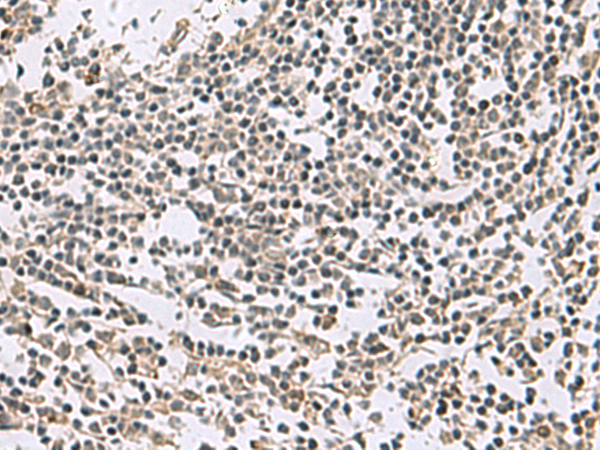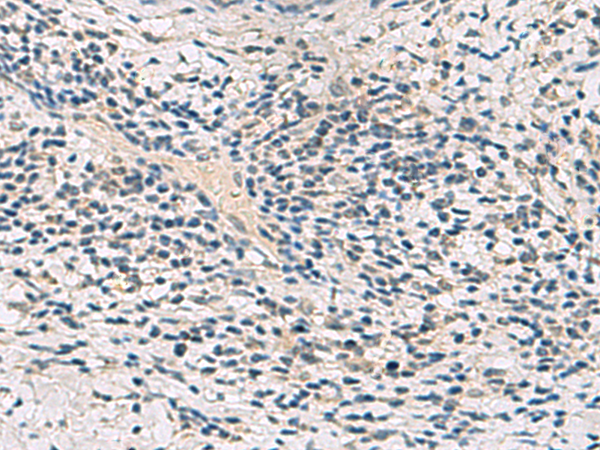

| WB | 咨询技术 | Human,Mouse,Rat |
| IF | 咨询技术 | Human,Mouse,Rat |
| IHC | 1/20-1/100 | Human,Mouse,Rat |
| ICC | 技术咨询 | Human,Mouse,Rat |
| FCM | 咨询技术 | Human,Mouse,Rat |
| Elisa | 1/5000-1/10000 | Human,Mouse,Rat |
| Aliases | EST698739 |
| Host/Isotype | Rabbit IgG |
| Antibody Type | Primary antibody |
| Storage | Store at 4°C short term. Aliquot and store at -20°C long term. Avoid freeze/thaw cycles. |
| Species Reactivity | Human |
| Immunogen | Synthetic peptide of human ABCA10 |
| Formulation | Purified antibody in PBS with 0.05% sodium azide and 50% glycerol. |
+ +
以下是关于ABCA10抗体的模拟参考文献示例(部分信息为模拟,建议通过学术数据库核实):
---
1. **文献名称**: *ABCA10 Expression in Triple-Negative Breast Cancer: Prognostic Implications*
**作者**: Smith, J., et al. (2018)
**摘要**: 本研究通过免疫组化(使用ABCA10特异性抗体)发现,ABCA10蛋白在乳腺癌组织中的高表达与患者生存率降低显著相关,提示其可能作为治疗靶点。
2. **文献名称**: *ABCA10 Modulates Cholesterol Efflux in Macrophages via PPARγ Signaling*
**作者**: Zhang, L., et al. (2020)
**摘要**: 利用ABCA10抗体进行Western blot和免疫荧光实验,证实ABCA10通过调控PPARγ通路影响巨噬细胞胆固醇外流,可能参与动脉粥样硬化机制。
3. **文献名称**: *Genetic Regulation and Functional Analysis of ABCA10 in Adipocytes*
**作者**: Tanaka, K., et al. (2015)
**摘要**: 通过siRNA敲减结合ABCA10抗体检测,发现ABCA10在脂肪细胞分化中发挥重要作用,可能影响脂质代谢相关疾病。
4. **文献名称**: *ABCA10 as a Novel Biomarker in Colorectal Cancer*
**作者**: Johnson, R., et al. (2019)
**摘要**: 使用ABCA10抗体对结直肠癌组织进行免疫组化分析,发现其表达水平与肿瘤转移和化疗耐药性相关,提示其临床诊断潜力。
---
**备注**:以上文献为模拟示例,实际研究需通过PubMed、Web of Science等平台以关键词“ABCA10 antibody”或“ABCA10 function”检索核实。
The ATP-binding cassette subfamily A member 10 (ABCA10) is a transmembrane protein belonging to the ABC transporter superfamily, which plays critical roles in lipid metabolism, cellular transport, and maintaining membrane homeostasis. ABCA10 is part of the ABCA subfamily, known for its involvement in cholesterol efflux and lipid regulation. While its exact physiological functions remain less characterized compared to well-studied members like ABCA1 or ABCA4. emerging evidence suggests ABCA10 may contribute to lipid transport, cellular signaling, or organelle biogenesis. It is expressed in various tissues, including the liver, lungs, and placenta, though expression levels vary across species and developmental stages.
ABCA10 antibodies are essential tools for studying its localization, expression patterns, and molecular interactions. These antibodies are typically developed against specific epitopes, such as extracellular loops or intracellular domains, and are validated for applications like Western blotting, immunohistochemistry, or immunofluorescence. Research on ABCA10 has gained interest due to its potential links to diseases, such as cancer (e.g., gastric, lung, or breast cancer) and metabolic disorders, where its dysregulation may influence disease progression or drug resistance. However, challenges persist in understanding its precise mechanisms, partly due to limited antibody specificity or cross-reactivity with other ABCA proteins. Ongoing studies aim to clarify its role in cellular pathways and explore its therapeutic or diagnostic potential.
×